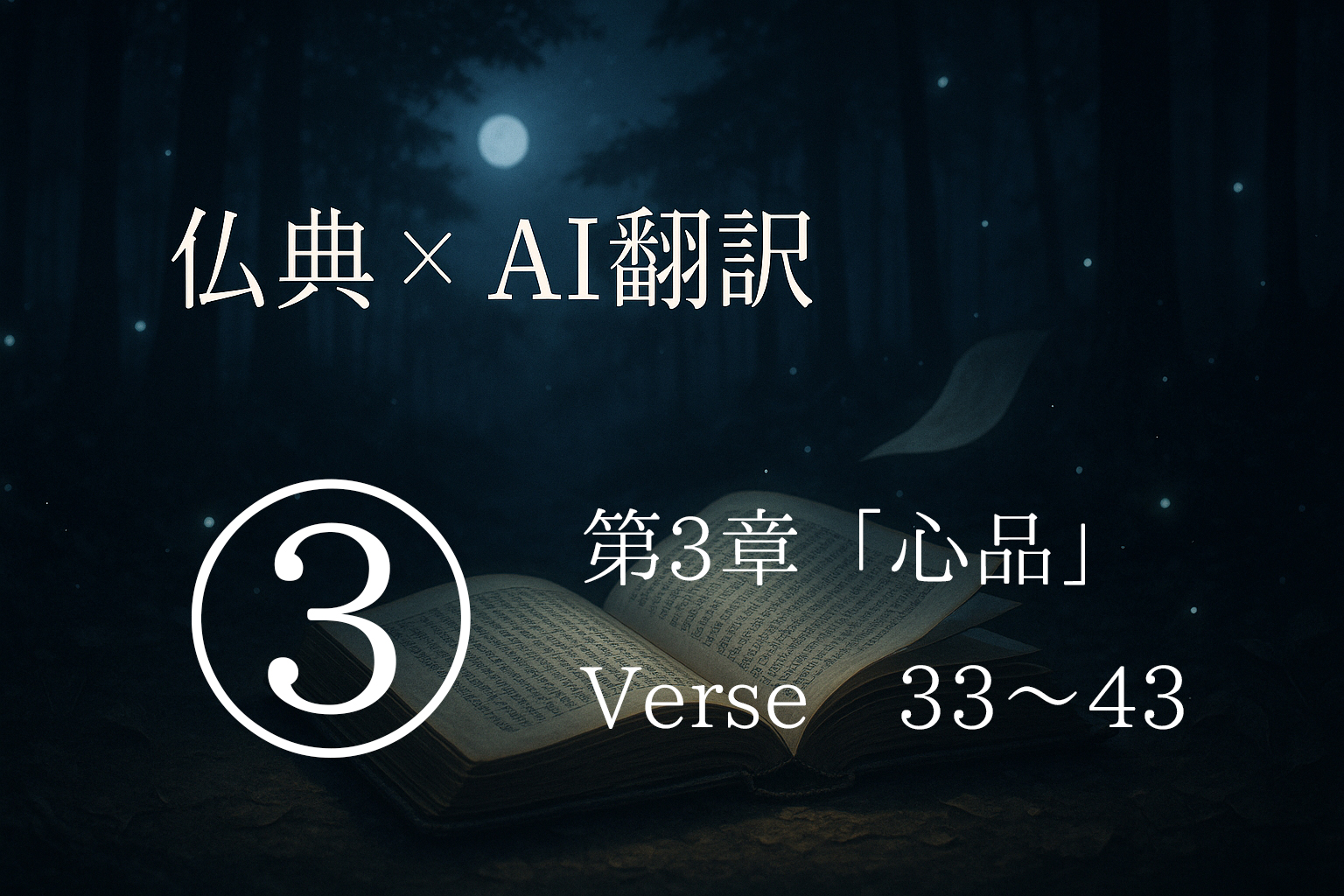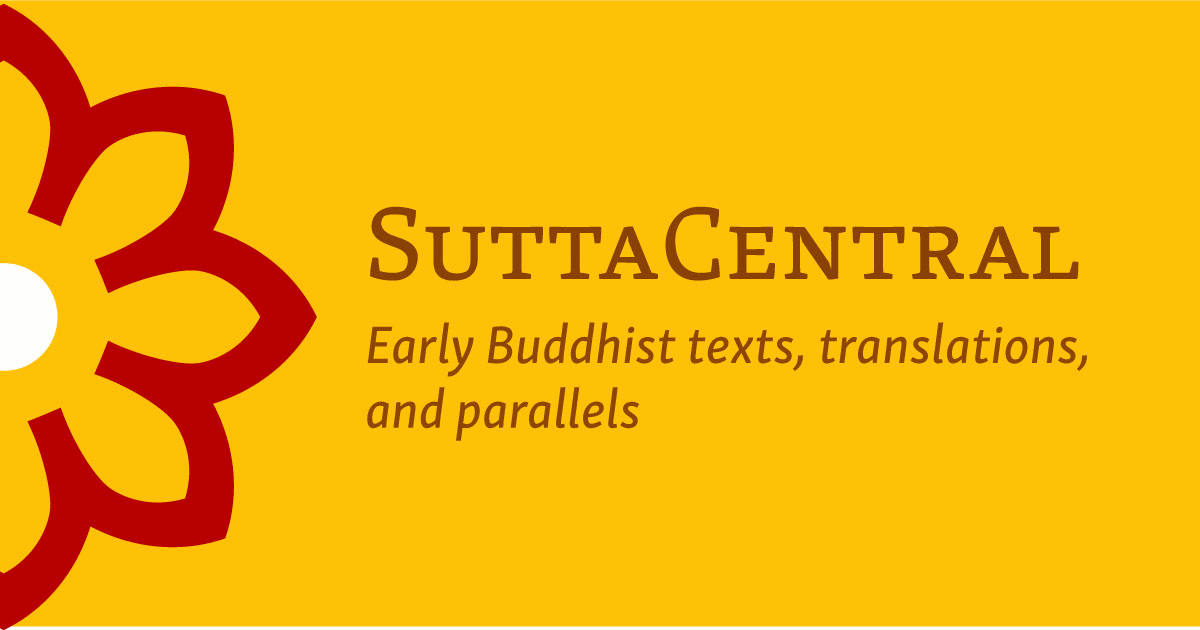◆ Verse 33
パーリ語原文:
Phandanaṁ capalaṁ cittaṁ, durakkhaṁ dunnivārayaṁ;
Ujuṁ karoti medhāvī, usukāro’va tejanam.
英語訳:
The mind, fickle and flighty, hard to guard, hard to control—
the wise straighten it as a fletcher straightens an arrow.
日本語訳:
心は動揺しやすく、落ち着きがなく、守るのも制するのも難しい。
賢者はそれを、矢をまっすぐにする職人のように整える。
◆ Verse 34
パーリ語原文:
Vārijo’va thale khitto, okamokataubbhato;
Pariphandatidaṁ cittaṁ, māradheyyaṁ pahātave.
英語訳:
Like a fish thrown on dry ground, pulled out of its watery home,
this mind thrashes about—one ought to escape the realm of Māra.
日本語訳:
水を離れた魚が地上で跳ね回るように、
心は苦しみ、もがく。マーラ(煩悩)の領域から脱しなければならない。
◆ Verse 35
パーリ語原文:
Dunniggahassa lahuno, yatthakāmanipātino;
Cittassa damatho sādhu, cittaṁ dantaṁ sukhāvahaṁ.
英語訳:
For the mind, hard to restrain, flighty, alighting where it wishes—
restraint is good. A tamed mind brings happiness.
日本語訳:
心は捉えがたく、軽やかで、好き勝手にさまよう。
だからこそ、心を制することが大切であり、調御された心は幸福をもたらす。
◆ Verse 36
パーリ語原文:
Sududdasaṁ sunipuṇaṁ, yatthakāmanipātinaṁ;
Cittaṁ rakkhetha medhāvī, cittaṁ guttaṁ sukhāvahaṁ.
英語訳:
Subtle and elusive, alighting where it will—
one should guard the mind well. A guarded mind brings happiness.
日本語訳:
心は見えにくく、巧妙で、どこへでも向かう。
だから賢者はそれをよく守るべきであり、守られた心は幸福をもたらす。
◆ Verse 37
パーリ語原文:
Dūraṅgamaṁ ekacaraṁ, asarīraṁ guhāsayaṁ;
Ye cittaṁ saññamessanti, mokkhānaṁ te pavattakā.
英語訳:
Far-traveling, solitary, formless, lying in a cave—
those who restrain the mind will be freed from Māra’s bonds.
日本語訳:
心は遠くまで旅し、一人で動き、形がなく、奥深くに潜む。
その心を制する者こそ、マーラの束縛から解き放たれる者である。
◆ Verse 38
パーリ語原文:
Anavaṭṭhitacittassa, saddhammaṁ avijānato;
Pariplavapasādassa, paññā na paripūrati.
英語訳:
For one with an unsteady mind, ignorant of the true Dhamma,
with wavering confidence, wisdom does not mature.
日本語訳:
心が定まらず、正しい法を知らず、信が揺らいでいる者には、
智慧は成熟しない。
◆ Verse 39
パーリ語原文:
Anavassutacittassa, ananvāhatacetaso;
Puññapāpapahīnassa, natthi jāgarato bhayaṁ.
英語訳:
For one whose mind is not overwhelmed, whose mind is untroubled,
free of evil and merit, there is no fear for one who is awake.
日本語訳:
心が覆われることなく、悩みにとらわれず、善悪をも離れた者には、
目覚めている限り、恐れはない。
◆ Verse 40
パーリ語原文:
Kumbhūpamaṁ kāyamimaṁ viditvā,
nagarūpamaṁ cittaṁ idaṁ ṭhapetvā;
Yodhetha māraṁ paññāvudhena,
jitañca rakkhe anivesano siyā.
英語訳:
Knowing the body to be fragile like a jar, establishing the mind like a fortress,
fight Māra with the weapon of wisdom, guard your victory, and live without attachments.
日本語訳:
この身体は壺のようにもろく、心は城のように確立されるべきである。
智慧という武器でマーラと戦い、勝利を守り、執着なく生きよ。
◆ Verse 41
パーリ語原文:
Aciraṁ vatayaṁ kāyo, pathaviṁ adhisessati;
Chuddho apetaviññāṇo, niratthaṁva kaliṅgaraṁ.
英語訳:
Soon this body will lie on the ground,
discarded and lifeless, like a worthless log.
日本語訳:
やがてこの身体は地に伏し、
意識を失い、不要な薪のように打ち捨てられるであろう。
◆ Verse 42
パーリ語原文:
Diso disaṁ yaṁ taṁ kayirā, verī vā pana verinaṁ;
Micchāpaṇihitaṁ cittaṁ, pāpiyo naṁ tato kare.
英語訳:
Whatever an enemy may do to an enemy,
or a foe to a foe, a wrongly directed mind can do worse.
日本語訳:
敵が敵に対して成すいかなる害よりも、
誤った方向に向いた自らの心の方が、より大きな害を及ぼす。
◆ Verse 43
パーリ語原文:
Na taṁ mātā pitā kayirā, aññe vāpi ca ñātakā;
Sammāpaṇihitaṁ cittaṁ, seyyaso naṁ tato kare.
英語訳:
Neither mother, father, nor any other relative
can do as much good as a well-directed mind.
日本語訳:
母も父も、他の親族でさえも、
正しく導かれた自らの心ほどには、己に善を成し得ない。
(第3章「心品」おわり)




コメント